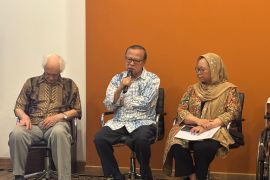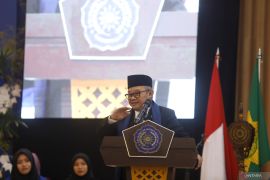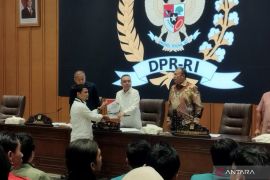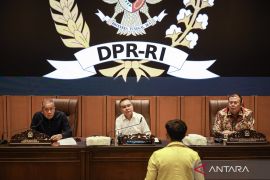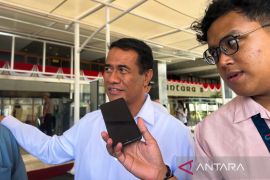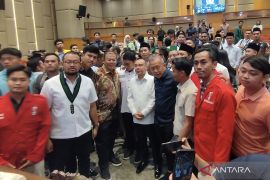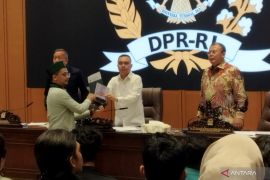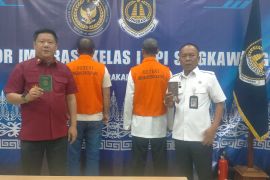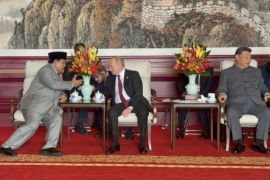"If we do not have the weapon, which is the legal umbrella to fight terrorists, it means that we are fighting them with hands being tied," Wiranto said.Jakarta (ANTARA News) - The draft revision of Law No. 15/2003 on Antiterrorism, which is under the deliberation of the House of Representatives (DPR), must be finalized soon.
Coordinating Minister for Political, Legal and Security Minister Wiranto called for the draft revision of Law No. 15/2003 to be finalized soon, as it constitutes a legal weapon for security officers in the fight against terrorism.
"If we do not have the weapon, which is the legal umbrella to fight terrorists, it means that we are fighting them with hands being tied," Wiranto said at his office in Jakarta recently.
The deliberation of the bill, which was submitted by the government to the House last January, has been slow as it is still in the stage of collecting inputs from the public. It was initially planned to be completed by June 2016. But, it is still in the stage of collecting public inputs for inclusion in the problem inventory list (DIM).
Inputs and suggestions are expected to come from the civil society, the Witness and Victim Protection Agency (LPSK) and the public in general.
According to Adhityho Rizaldi, a member of the Special Committee on Antiterrorism Bill of the DPR, the civil society must be involved in drafting the Bill on Antiterrorism.
"The civil society must be involved so that the bill, after being put into law, could be implemented, particularly in the context of counter radicalism and deradicalization," he said in a written statement on October 18.
The government had submitted the draft revision of the antiterrorism law to the House after a terrorist attack in the Sarinah Area in Jalan Thamrin, Central Jakarta, on January 2016.
Bobby, who is a member of the Golkar Party Faction in the House, said that so far his faction has invited representatives from Civil Society Against Violent Extremism to obtain inputs for drafting the law.
"There are articles considered controversial; yet, the revision is a unified approach. It is inseparable and interdependent among efforts to build a resilience system, alertness, prevention, protection, execution, and the handling of correctional process, social reintegration and interlinked cooperation efforts," he said.
Bobby stressed that radicalism and terrorism are common enemies, which must be handled systematically and comprehensively. Radicalism and terrorism cannot not be handled from legal perspectives alone.
According to Wiranto, cooperation with the people is needed to deter radical doctrines and terrorism. The government is also fighting to overcome poverty and injustice, which are the roots of radicalism in various countries, including Indonesia.
"The impact of radicalism and terrorism will be faced by the whole nation. Hence, before it happens, we should fight them," said Wiranto.
Last August, member of the Special Committee on Antiterrorism Arsul Sani said that the progress in the debate of the Draft Revision of Law on Antiterrorism was still in the stage of receiving inputs for inclusion in the problem inventory list (DIM) from each of the factions in the House.
In order to collect various inputs for the drafting of the antiterrorism law revision, Commissioner General Suhardi Alius, the chief of the National Counter-Terrorism Agency (BNPT), said the Witness and Victim Protection Agency (LPSK) should be involved in the discussion on the revision of draft law on antiterrorism.
The special committee of the Commission III of the Parliament on law revision was suggested to invite LPSK, Alius said in Jakarta on October 25. The agency needs to be involved because it has direct contacts with victims of terrorism, he said.
"The revision will also discuss regulations on compensation and rehabilitation for the victims of terrorism," he noted.
According to him, the current law has some loopholes because, among other things, it does not cover the explanation and criteria on victims of terrorism.
He said he also hoped that the antiterrorism law now being deliberated in the House of Representatives would provide a strong legal umbrella for action to deter known terrorism threats.
So far, he said, BNPT is able to detect terrorism threats earlier, but it has not been able to take actions because the terrorists had not carried out their plans.
"Security officers can take actions only after the terrorists carry out their plans. Therefore, we include this matter in the amendment of the Law on Terrorism (now being discussed in the DPR)," he said.
According to the BNPT, Indonesia recorded 69 terror attacks between 1999 and 2016.
"Most of the terror attacks targeted vital objects and public places like in western countries," BNPT Deputy Chief for Prevention, Protection and Deradicalization Major General Abdul Rahman Kadir said Meanwhile.
Addressing a function to familiarize the public with a blueprint for the protection of the agency, he said terrorism not only threatens the state sovereignty but also claims lives and inflicts material losses.
He said terrorism is actually oriented to massive media coverage with public places as its target. "This is visible from the targets of terror acts including public places and vital objects. This way the terror acts would be covered and disseminated massively so they will lead to widespread scare in the public," he said.
To anticipate various threats of terror acts in the future, the BNPT felt it necessary to launch the blueprint for the protection of the agency, he said.
So far the country has no had official guide which may serve as a reference in its effort to protect objects which are vulnerable to terror acts.
"It is likely that each government or private agency has had guide but there has not been special guide to dealing with terrorism threat," he said.(*)
Reporter: Andi Abdussalam
Editor: Heru Purwanto
Copyright © ANTARA 2016

